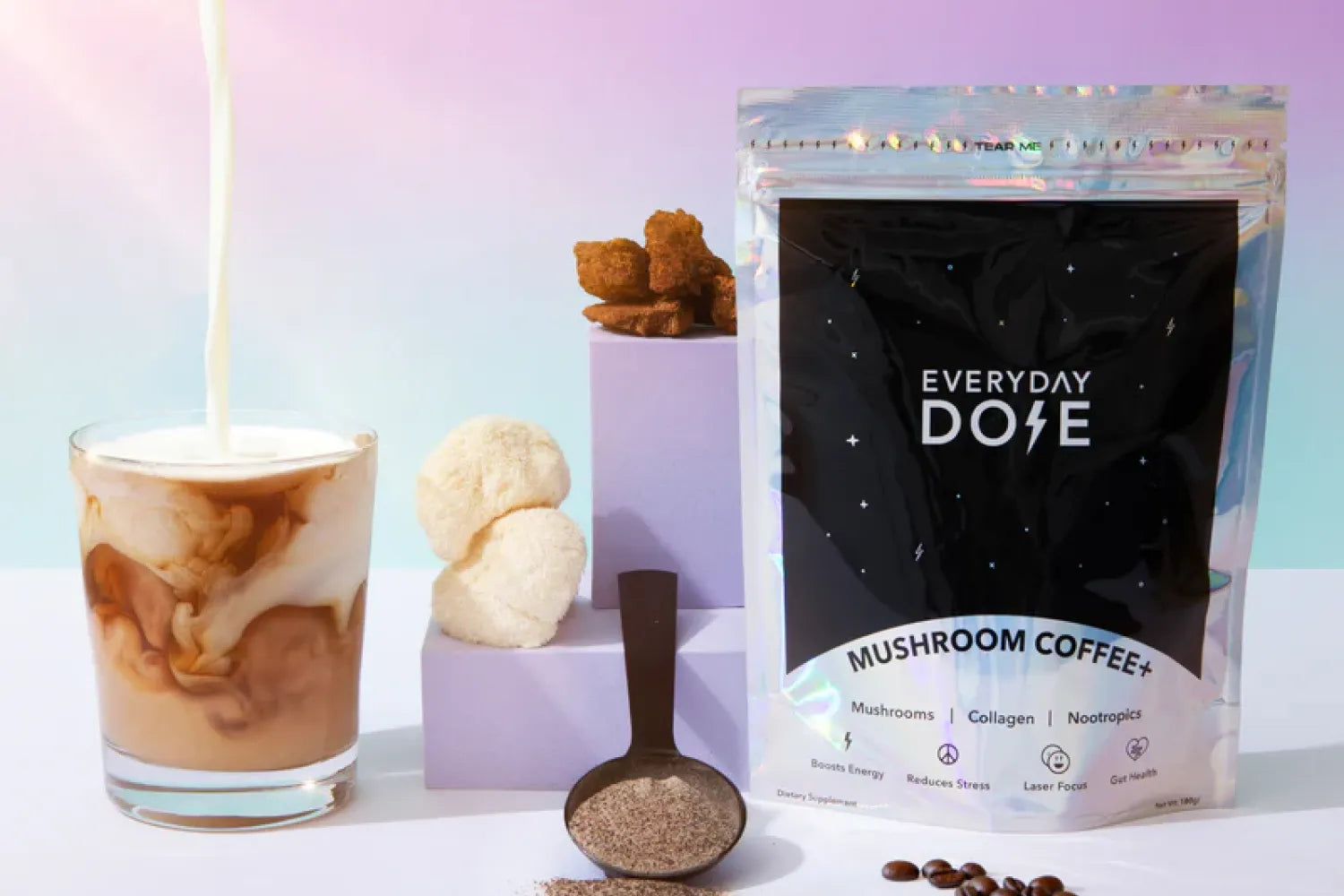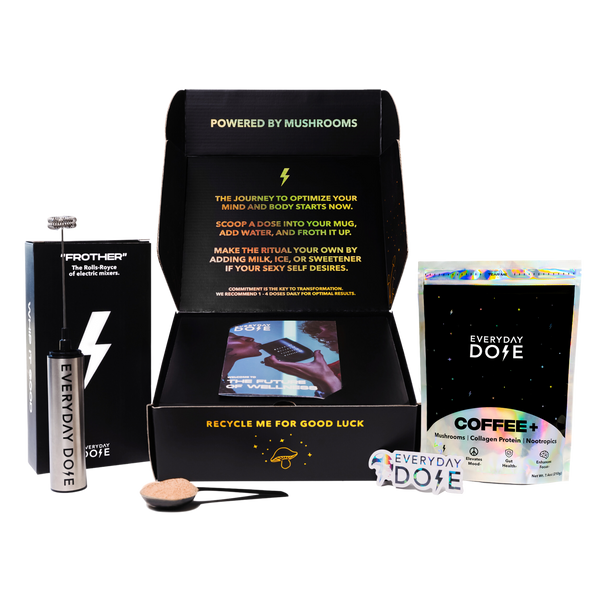8 Best Natural Stimulants According to Science

Have you ever juggled so many responsibilities that you felt like you needed an extra hand (or brain)? These days, many people throw back an energy drink to get the brainpower they need to push through the day.
However, there are plenty of natural ways you can support your brain function and energy to help you get things done. Read on to learn more about stimulants, the best natural stimulants for brain function, and how else to support energy.
What Are Stimulants?
Stimulants are substances that can influence the central nervous system (CNS). The CNS is made up of your brain and spinal cord, and it’s in charge of several body processes. For instance, your CNS dictates how quickly you digest food, how fast your heart beats, and how quickly you think.
It does all of this primarily through the work of epinephrine, which is also called adrenaline. This hormone activates the fight-or-flight response. The fight-or-flight response gets a bad rap, but it’s there to help us get through stressful situations.
Back in our early evolution, this response helped increase blood flow, heightened our cognitive abilities, and generally gave us the tools we needed to outthink or outpower the threats we faced. This might not seem useful today when most people go their whole lives without being placed in life-threatening situations. However, effects like heightened thinking and increased energy can still be helpful.
8 Best Natural Stimulants
When you think of “stimulants,” you might think of under-the-table deals. However, there are plenty of legal stimulants that are actually found in nature. Here are just a few of the natural stimulants we have available to us.
1. Coffee
No list of natural stimulants would be complete without mentioning coffee. This drink gets its power from caffeine, which can also be found in chocolate (in small amounts) and certain types of tea.
Caffeine is commonly used to support energy, encourage alertness and mental focus, and support cognitive performance. However, drinking too muchtoo many cups of coffee can cause side effects like indigestion, anxiety, and trouble sleeping.
While there is some general guidance out there about how much caffeine you should take, everyone metabolizes caffeine differently. Your individual caffeine threshold may be much lower than the daily recommended limit of caffeine.
2. Camellia Sinensis
Camellia sinensis, also known as the tea plant, is where green, black, white, and oolonggreen tea come from. This plant naturally contains both caffeine and an amino acid called L-theanine.
This amino acid can help support focus, memory, and sleep, as well as encourage feelings of relaxation. As an added bonus, L-theanine can help mitigate the unpleasant side effects of taking too much caffeine.
3. Ginseng
Asian ginseng has traditionally been used for hundreds of years to increase energy and encourage quick thinking, and studies show that these benefits are real. Make sure you read the label closely, because “ginseng” could refer to American ginseng, Asian ginseng, or Siberian ginseng. These are all very different plants with different benefits.
4. Theobromine
Theobromine is a stimulant that’s similar to caffeine and is mainly found in cocoa. However, instead of providing the almost instant rush of energy and dramatic crash that comes with caffeine, theobromine supports a smoother rise and fall of energy and mental alertness. This also means the energy you receive is more sustained throughout your day.
5. Guarana
Guarana comes from the Paullinia cupana plant, which grows naturally in Brazil and other places in South America. The seeds of this plant are remarkably high in caffeine, containing up to eight percent caffeine. For comparison, coffee beans contain up to two percent caffeine. This is why guarana is such a popular ingredient for energy drinks.
6. Yerba Mate
Yerba mate is a plant that’s mainly found in South America and is deeply ingrained in local tribal culture. This herb is high in natural caffeine and was worshiped by indigenous tribes for its stimulant properties. Yerba mate and Camellia sinensis are the only plants that are currently used to make caffeinated teas — all other teas are completely decaf.
7. Maca
Maca root is another traditional South American remedy that can support energy. Some studies show that it can reduce stress-related fatigue, and this is how the plant has traditionally been used. Other studies show that maca can increase libido in women who are taking antidepressants, which speaks more to its stimulant properties.
8. Rhodiola
Rhodiola rosea is an herb that is commonly used to reduce stress and calm the nervous system. Some studies show that Rhodiola can support mental health, encourage alertness and energy during the day, increase cognitive performance, and increase motivation. This lines up with how it has been used in folk medicine for hundreds of years.
9. Cordyceps
Cordyceps mushrooms can actually increase your body’s ability to create ATP, which is your body’s main energy source. They can also increase your body’s ability to use oxygen, which can lead to better workouts, better endurance, and better overall physical abilities.
10. Cayenne Pepper
If you’ve ever had a runny nose after eating something spicy, it’s because spicy foods can increase blood flow. This can increase your body’s ability to move oxygen, which can help you feel more energetic and focused throughout the day. How’s that for “spicing’’ things up?
11. Reishi Mushrooms
Reishi mushrooms may not be actual stimulants, but they can help indirectly increase energy. These mushrooms can support a healthy immune system, which can help your body fight off unwanted bacteria and viruses. Plus, many people claim that reishi can decrease stress due to its adaptogenic properties, which can also increase energy levels.
12. B Vitamins
B vitamins are the main building blocks of energy production and processing. Without B vitamins, we can feel foggy, sluggish, and exhausted. There are 9 different types of B vitamins, and all of them are important for energy, so make sure you take a full B-complex vitamin!
13. Ashwagandha
Ashwagandha is known for its ability to lower cortisol, which plays a huge role in whether we feel energized or tired. However, a little-known benefit of this dietary supplement is that it can also increase physical performance for both men and women, as well as libido.
14. Gotu Kola
This herbal stimulant has a roundabout way of increasing energy. Instead of physically increasing energy, it can support neurotransmitters like dopamine and serotonin, which help us feel happy and content. This can reduce stress and also help us feel motivated to get things done.
15. Lion’s Mane Mushroom
Finally, lion’s mane mushroom can support focus, brain function, memory-making skills, and speed of thinking in healthy adults. This fantastic fungus can also encourage high-quality sleep, support gut health (which is the foundation for overall health, including energy production), and support mental health. It’s like a five-in-one supplement that covers all your bases!
How Else Can You Support Energy?
Taking stimulants can be a great way to help you feel energized and motivated, and some of them can even support focus to help you be efficient with your energy. That said, there are some other lifestyle changes you can make that can also support your energy and increase your brainpower.
These include:
- Getting plenty of exercise
- Drinking enough water
- Getting the recommended amount of sleep
- Eat a balanced diet
- Encouraging high-quality sleep by practicing sleep hygiene
- Managing stress through meditation
- Eating balanced meals with protein and fatty acids
Because taking stimulants can have such intense effects on your nervous system, it may be better to work on these lifestyle changes before resorting to stimulants. In a way, it’s like addressing the root of the problem. Instead of relying on a pot of coffee to get you through the day, simply work on your sleep schedule, manage your stress, and make healthier dietary choices.
Wrapping It All Up
Stimulants are a type of chemical that can stimulate your senses, your cognitive abilities, and even your energy. When you hear the term “stimulant,” you might naturally think of caffeine — however, there are plenty of other natural stimulants out there. These include L-theanine, lion’s mane mushroom, cordyceps mushroom, and rhodiola.
At Everyday Dose, we understand that stimulants can sometimes come with negative side effects. That’s why our mushroom blends feature enough caffeine to support brain power without contributing to unpleasant side effects. Discover our collection of mushroom-powered nootropic blends today!
Sources:
Stimulants - StatPearls | NCBI Bookshelf
Everything to Know About Maca Root and Its Benefits | Banner
Rhodiola Rosea | Mental Health America
What Are B-Vitamins? | EatRight.org
Cayenne - Health Encyclopedia | University of Rochester Medical Center








